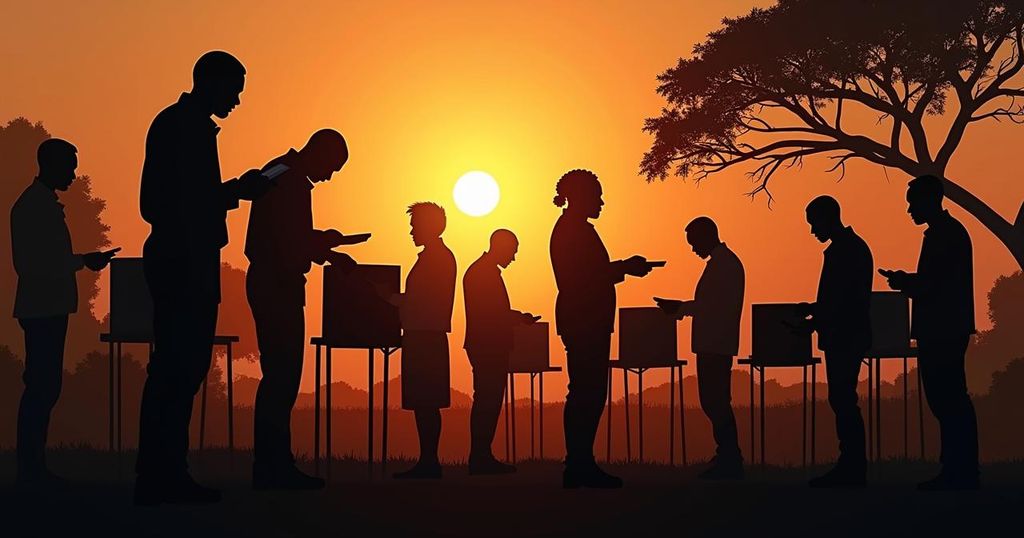Mozambique will conduct presidential elections on Wednesday, potentially extending the ruling Frelimo party’s nearly 50-year reign since independence. Daniel Chapo is the ruling party’s candidate, while independent Venancio Mondlane poses the key challenge. Voter concerns include the ongoing jihadist insurgency in Cabo Delgado, economic mismanagement, and accusations of electoral fraud against Frelimo. The outcome could shape Mozambique’s future amid calls for greater stability and transparency in governance.
On Wednesday, Mozambique will conduct presidential elections, marking a significant moment in the nation’s political landscape as the ruling party, the Front for the Liberation of Mozambique (Frelimo), seeks to maintain its grip on power that has lasted for 49 years since independence from Portugal in 1975. Daniel Chapo, aged 47, is the Frelimo candidate poised to succeed incumbent President Filipe Nyusi, who is completing his maximum allowable two terms. The principal challenge comes from independent candidate Venancio Mondlane, 50, who aims to resonate with a disenchanted youth facing high unemployment and poverty rates. In addition to selecting a president, voters will also determine their parliamentary representatives and provincial governors. The election transpires in the context of ongoing instability in Cabo Delgado province, exacerbated by an insurgency that has displaced over 1.3 million individuals since its onset. Both leading candidates have pledged to address these issues. As the election unfolds, the credibility of the voting process is under intense scrutiny. Frelimo has faced accusations of electoral malpractice, including ballot-stuffing, particularly highlighted during local elections in the previous year, where it purportedly won 64 of 65 municipalities. Despite these claims, the party has consistently denied involvement in such actions and assured the public of a transparent electoral process. International observers, including a mission from the European Union, are present to oversee the event’s integrity. Historically, Frelimo established a dominant political position after the country’s independence, effectively leading to a one-party state for many years. The civil war against the opposition group, the Mozambique National Resistance (Renamo), which persisted for 15 years, officially ceased in 1992. Although Renamo continues to participate in elections, its influence appears to be waning. This year’s election also emerges against the backdrop of significant economic turmoil, stemming from a scandal involving the misappropriation of over $2 billion in foreign loans, which surfaced in 2016. Despite the challenges presented by the independent candidate Mondlane, who previously aligned with a coalition of opposition parties, analysts predict that Frelimo will most likely sustain its long-standing rule within Mozambique. Chapo’s nomination as the party’s candidate came after a surprising internal party election, and if elected, he would notably be the first leader born post-independence. Time is of the essence as vote-counting will commence immediately after the polls close, with preliminary results expected shortly thereafter, and a complete count mandated within 15 days to confirm the election’s outcome.
Mozambique has experienced a tumultuous political history since gaining independence in 1975, primarily dominated by the Frelimo party, which has been in power since then. The nation endured a protracted 15-year civil war that ended in 1992, resulting in a re-establishment of democratic processes. The upcoming elections are pivotal for assessing the political landscape and the potential shift in governance, particularly in response to the ongoing jihadist insurgency and economic difficulties that have affected many citizens. The contest between Frelimo’s Daniel Chapo and independent candidate Venancio Mondlane will encapsulate various critical national issues, including stability, economic hardship, and the quest for democratic integrity.
The election in Mozambique reflects not only the battle for political leadership but also the broader struggles for stability and transparency in governance. As the nation prepares to vote, all eyes are on the integrity of the electoral process and the outcome, which could either reaffirm Frelimo’s enduring control or usher in a shift in leadership under Mondlane, appealing to the aspirations of a growing youth demographic. Regardless of the results, Mozambique’s journey toward democratic consolidation and economic recovery will remain a significant focus in the coming years.
Original Source: apnews.com






